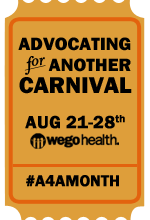Hello to all my readers
I would like to take this opportunity to thank Christine Miserandino (@bydls) of ‘But You Don’t Look Sick‘ and WEGO Health for inviting me to take part in the Health Activist Roundtable yesterday as well as the other participants: Michele (@lifeaftertrauma), Andrea (@thegreatbowelmovement) and Amy (@abeeliever).
Unfortunately, there were some technical difficulties on my end which prevented me from fully participating so thought I would take an opportunity to discuss my thoughts on some of the issues that were discussed.
Topic 1: How did it feel to have symptoms but no succinct diagnosis?
As with most people, I think that frustration is the first emotion that people feel when experiencing symptoms without an accurate diagnosis. My frustration seemed to stem from the lack of understanding from the doctors, a lot of what is written regarding dizziness seems to be directed towards senior citizens, so when I presented with dizziness at the age of 8 many doctors were simply stumped.
Frustration is certainly a key word in terms of invisible illness – frustration as the problems and all what is associated with it cannot be seen so is often met with scepticism from medical professionals, as if we are faking and just want some attention. Frustration as often with many illnesses, test after test comes back clear, and no cause can be found and so that cycle continues time and time again, with a definitive diagnosis taking months and sometimes years to come to fruition.
Then instead of doing full investigations on what may be the cause, I was stuck with the label of ‘anxiety’, stating that the anxiety was simply psychosomatic – the easy diagnosis, the one doctors seem to use when they are truly stumped and haven’t a clue what was going on or are too lazy to carry out full investigations or even write referrals. Another emotion is loneliness and isolation – all caused by the lack of knowledge or understanding of what is going on inside of me, and having no one around who is going through the exact same experiences as myself. This all started when I was 8, when the internet was still in its infancy and was something that I did not have access to, and social media certainly did not exist. If only it happened when I was older and had access to the internet and social media sites, then I may not have felt that loneliness and isolation. I just felt so different from my friends and peers from school, something was happening to me, something which isn’t visible, and so was not really understood by anyone.
Interestingly, in terms of the problems with the legs and the symptoms of the heaviness and stiffness associated with the spastic paraparesis, I only found out about them after the diagnosis. As the cause happened at birth, I have always experienced these problems with my legs, so thought they were normal as I hadn’t known any different. So, is important to remember that every little experience inside of your body that feels different or normal should be noted and talked about with the doctor – after all it could hold the key to getting that final diagnosis…
Topic 2: How did you navigate the health system during your quest for a diagnosis?
This is an interesting topic in terms of the UK Health System, as obviously it is extremely different to that of the US Health System. As in the UK we have a National Health System, so we do not pay to go and see medical professionals or even for treatment after receiving a diagnosis.
This obviously provides challenges in itself, such as long waiting times to see specialists and consultants, especially within certain specialities such as neurology. So, often GP’s will only send referrals when it is really needed.
And as I was labelled with a ‘psychosomatic related condition’ then doctors became very sceptical regarding any symptoms that I was experiencing, linking them all to the anxiety disorder and depression that was diagnosed. Once you are stuck with a certain label it is certainly very difficult to get rid of that particular label, and instead of investigating the problems, I was referred to psychologists, psychiatrists, occupational therapists and other mental health professionals – they didn’t seem to want to believe me when I said the anxiety problems that I was experiencing all started after the dizziness, and the panic attacks that I eventually had started after the dizziness had come on. I became dizzy and then I started panicking, instead of the other way around.
Deep down, I had always known or at least suspected that there was something wrong, that there was an problems inside of me that was the cause of all these symptoms, and it wasn’t until I left university and grown up somewhat, I became advocating for myself and pushed for being referred to consultants and specialists as I just wanted to find out what was wrong or at least put my mind at ease that it wasn’t anything serious.
Advocacy is an important part of the journey towards diagnosis, you really need to learn to stand up for yourself with doctors and other medical professionals! Trust me, if you stay quiet and meek as I often was you may never find out those all important questions!
Topic 3: Did the internet or social media help you in finding your diagnosis?
As I said before, when all of the symptoms started I was very young, and the internet was still in its infancy and as I had no real access to it as we didn’t have it at home. Once I got a bit older, I admit I did ‘google’ the symptoms I was experiencing. This was when I found that much of what is written about dizziness and balance related problems, will often regard it as something which affects the senior population, and could not find any information regarding these problems within my particular age group.
No, the internet and social media really didn’t help through the particular diagnosis stage, but has really helped me since then. The support I have found since then has been incredible and have been lucky to have found life-long friends from various support groups as well as people I have met through Twitter, Facebook and of course, WEGO Health!
Topic 4: have you turned to the internet with symptoms or how your symptoms relate to your diagnosis and what goes with it?
Before the diagnosis, I had to really stop myself from constantly ‘googling’ my particular symptoms as it can be extremely frightening, especially when all the worst-case scenarios are presented on the screen. As often what happens with new medical students you will convince yourself that you have something terribly wrong with you!
However, since the diagnosis I have done some research on the brain stem and much on neurology, and have found that damage to certain areas of the brain stem certainly explains the symptoms I have experienced and continue to experience. Looks like the doctors were finally right!
Topic 5: How did you feel to finally get your diagnosis?
I found it to be a very bittersweet experience, on the one hand I was so relieved to have the diagnosis – I finally got the validation from the doctors, that all what I have been experiencing wasn’t in my head after all, and instead was caused by damage to an area of the brain. However, it was also quite upsetting as the consultant informed me that there wasn’t anything that can be done to treat or cure the condition, only certain medications that could attempt to control the severity of the symptoms, which unfortunately I have found not to be effective and continue to be severely affected by certain symptoms. The consultant further informed that the symptoms and the lesion to the brain stem seems to be stable and there should be no further deterioration in symptoms. unfortunately this hasn’t been the case as certain symptoms have deteriorated, some quite markedly where I am the point of being assessed for a wheelchair due to the weakness in the legs.
Another point to note is that doctors do not know everything; even these top consultants!
Topic 6: How did the diagnosis change the way you thought of your health and body, etc?
As I said before, I finally felt validated and relieved that there was an explanation of my symptoms. Now that I finally knew after years of searching and endless doctors appointments and hospital visits I could finally live instead of merely existing within my body and my life in general.
Topic 7: How did your diagnosis change the way others thought about you and your health?
I’m not sure as I haven’t really discussed it with anyone but I now notice that nobody really says things like they used to. Things like “You should get out more”, “You need to push yourself to be able to do things” and so on. They have now come to realise that the symptoms were not imagined or psychosomatic, and there was a physical reason for them. It’s like they think no longer think that I am to blame for what has happened to be and how I am – it’s like they now think I have a valid excuse to be how I am.
Topic 8: Do you have any tips for those currently searching for a diagnosis; now that we are over that bridge what would you tell someone still on the other side?
I would advise someone still looking for that validation and important diagnosis to not to give up, and to not be afraid to challenge doctors or to ask questions. We all need to speak up and to advocate for ourselves – if my parents and I didn’t then I may still be where I was 2 years ago; without answers, validation or that diagnosis.
Thank you, and thanks again to everyone at WEGO Health and to Christine for being a wonderful hostess!








